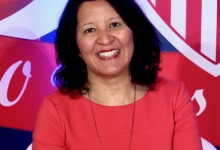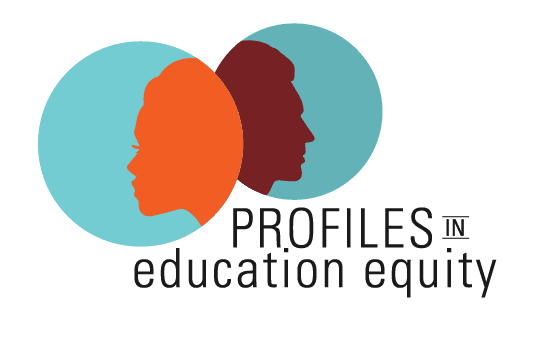Profiles in Education Equity: Caroline Sanchez Crozier, LULAC
For more than 15 years, Caroline Sanchez Crozier has served as the Illinois Education Chair for the League of United Latin American Citizens (LULAC), the oldest and largest civil rights…

 For more than 15 years, Caroline Sanchez Crozier has served as the Illinois Education Chair for the League of United Latin American Citizens (LULAC), the oldest and largest civil rights national organization for Latinos. She is also the founder and president of CSC Consulting Group, which has been providing innovative educational and technology services to K-12 schools in Illinois and private schools in Mexico for 30 years.
For more than 15 years, Caroline Sanchez Crozier has served as the Illinois Education Chair for the League of United Latin American Citizens (LULAC), the oldest and largest civil rights national organization for Latinos. She is also the founder and president of CSC Consulting Group, which has been providing innovative educational and technology services to K-12 schools in Illinois and private schools in Mexico for 30 years.
My work as LULAC Illinois Education Chair is to lead on education issues for the Latino community. In this role, I engage in advocacy and policy activities to represent the voices and needs of Latino students, educators, and parents. Illinois, like many other states, is experiencing a fast-growing Latino population, and yet their representation is not reflective of student demographics. It is important to be at the table at all levels of leadership so that issues that are unique to Latinos are heard, understood, and addressed. For this reason, my work is to recruit volunteers to join LULAC.
As LULAC members, we collaborate with leaders in education reform who impact policy and address equity in Illinois. One key partner of LULAC is Advance Illinois. Their positions on education policies are aligned to ours, and they value our input as it relates to the specific needs of Latinos. Currently, LULAC is expanding the work around key issues that Advance Illinois has set. We continually seek other partners like Ed Trust with similar goals and missions to assist with research and other resources. At the state level in Illinois, I have recently established working committees with Latino advocates and practitioners who have firsthand experience in the following areas:
One of the key issues was to help change a 20-year law for school budget allocation with a formula that was broken. The old law placed Illinois as one of the states with the greatest disparity in equitable funding for schools, with more dollars going to the wealthier districts than to the needier schools. Advance Illinois led the work to change the law. They spent more than five years in strategic coalition building to get legislators and the governor to address the problem. My involvement with LULAC was necessary to demonstrate that Latinos were not being well served by the broken formula; the state wasn’t allocating dollars for Latino serving schools, and not enough to address English learner needs. I participated in numerous hearings in Springfield, invited busloads of parents to join us at the Capitol, wrote op-eds in the Sun Times, attended town hall meetings across the state, spoke to legislators, and canvassed to get people to support the new legislation. These are just some of many activities, which I gladly invested in and took time away from my business, that were worthwhile to support funding reform that would benefit all Illinois students.
The proposed bill became law in 2017. Today, the new law has a multi-year equitable strategy for funding schools. It was a monumental task, but mission accomplished, through relentless work and coalition building that I was proud to be a part of.
My family. Fifty years ago, at the age of 8, I crossed the Arizona border with my family. We arrived in Chicago, during the historic 1967 snowstorm. We are one of the many lucky families who for centuries entered the U.S. with few problems. I was the first in my family to go to college, with LULAC helping navigate through college applications and help waive fees. My personal connection to LULAC was never forgotten, and I have been a LULAC volunteer through most of my professional life, recently expanding my role at the national level.
Like so many, we are the American Dream. Today, with my 10 siblings and 76 extended family members, we are entrepreneurs, educators, psychologists, counselors, engineers, accountants, musicians, architects, technicians, attorneys, coaches, and professionals with masters and doctorates. We volunteer, donate for scholarships, advocate for equity and quality education, fight for civil rights, and give back to our community. Why? Because our parents taught us respect, honor, kindness, strong work ethic, pay it forward, and a strong commitment to education. My family was profiled in We The Immigrants Blog with the full story.
Student demographics. There is a growing population of students of color, particularly immigrants and Latinos. But P-12 schools are not led by enough teachers of color, nor does the school administration have the breadth and depth of understanding to reflect their students or communities. As a result, the funding, human capital, resources, and overall system supports are not in line to meet current college and career readiness standards and workforce requirements. We must work collaboratively and bring our advocacy work using collective resources and mindsets to change what is not working and replicate what is working.
“Be the change you wish to see in the world” by Ghandi
This quote motivates me to be a change agent on what we are passionate about. In my case, equity in education is vital for everyone to have an equal opportunity to grow as individuals, thrive in their careers, be compassionate, and contribute toward a peaceful and welcoming society.
After serving as LULAC Illinois Chair for 15+ years, I am being intentional to pass the baton by engaging a new generation of emerging Latino leaders. Recently, I have taken a new challenge being appointed as LULAC’s National Education Committee Chair in 2019. The new LULAC leadership has brought a new team of Latino leaders to the committee from multi-states, including Illinois, California, Texas, and Arizona, to set a new platform for Latinos in education.
With a 90-year history of civil rights accomplishments and leadership representing Latinos, LULAC is preparing for a renewed focus on education leadership to empower current and emerging Latino leaders for leadership, equity, and innovation to elevate the lives of our fast-growing community in a country that is more diverse than ever.